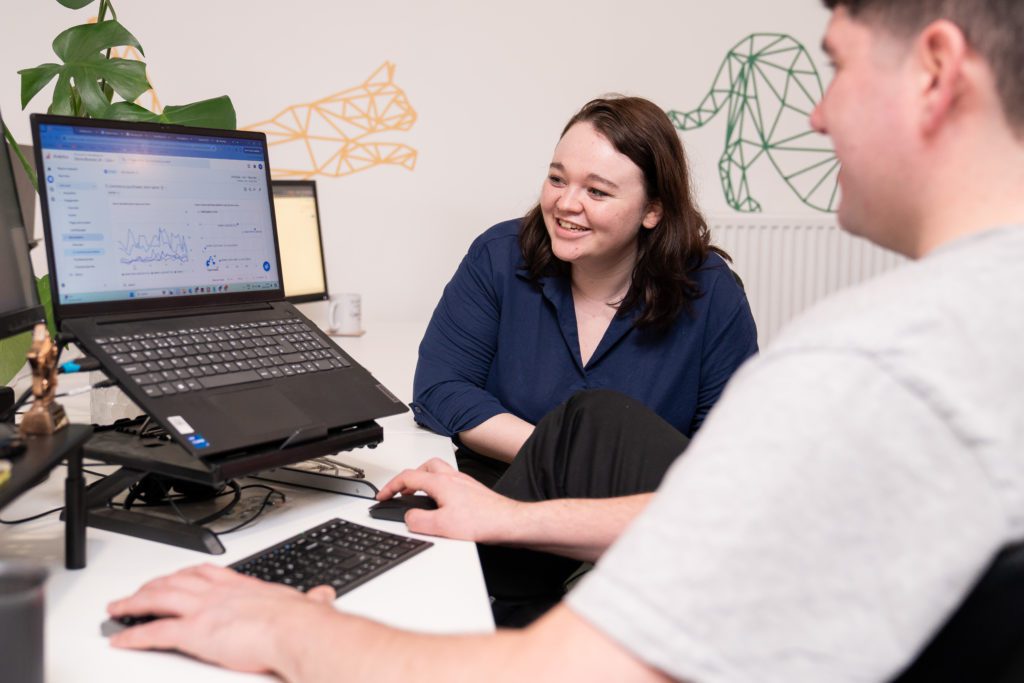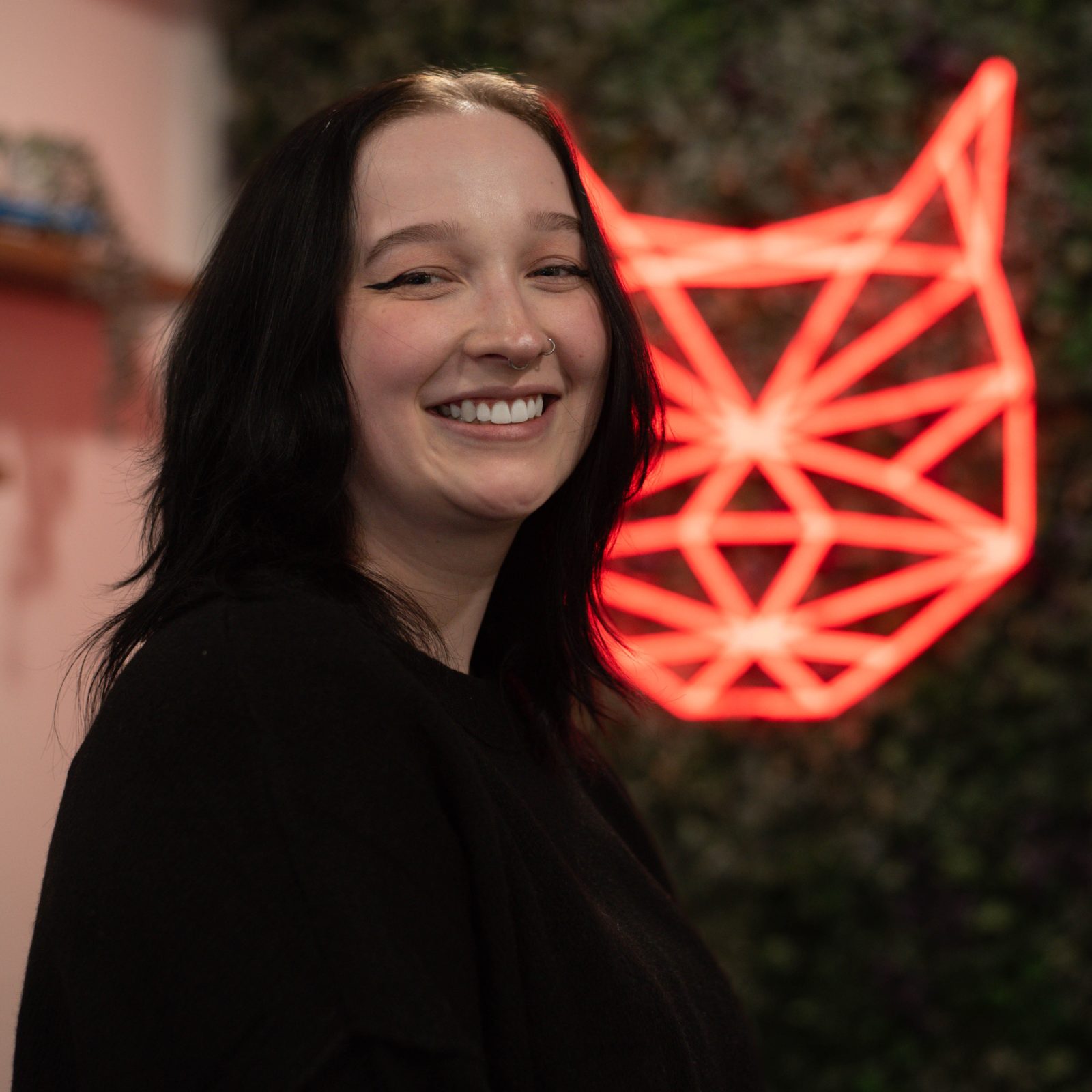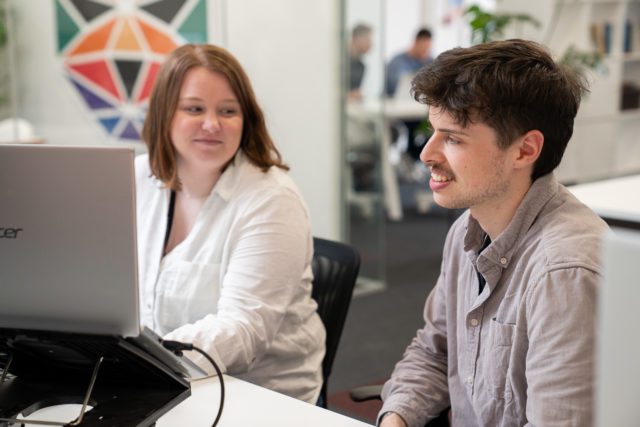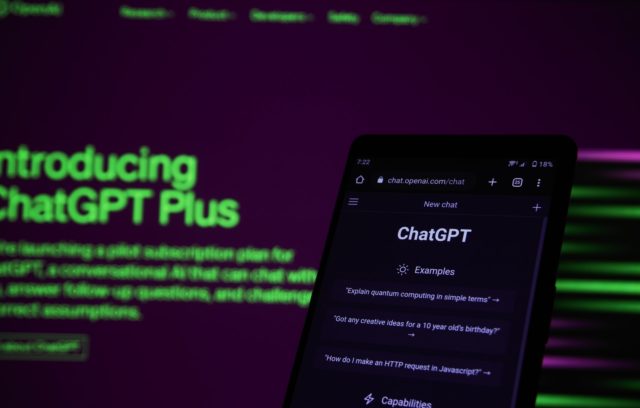A well-structured SEO strategy is the backbone of any successful digital marketing campaign. Whether you’re aiming to boost organic traffic, increase conversions, or outrank competitors, having a clear, step-by-step approach is key. But where do you start?
In this guide, we’ll walk you through how to build an SEO strategy from the ground up – covering everything from keyword research and technical audits to content optimisation and link building.

Month 0 – sometimes called a set-up month – is something that many business owners skip. I know you might be keen to crack on and improve your organic traffic, but you’ll set yourself up for success by laying a good foundation.
The tasks in Month 0 will help you benchmark your progress, prioritise the most impactful actions, and identify quick wins that can be implemented immediately.
How does SEO align with your wider business objectives? Setting SMART goals ensures that your SEO strategy is focused, trackable, and tied to real business growth. It’s no good just saying your goal is to “improve your organic presence”, your goals need to be SMART. This means:
So, instead, a more useful SMART goal might be to “Increase organic traffic to our key service pages by 25% within six months by improving on-page SEO.”
Learn more about crafting the perfect campaign goals in this blog: Devising Your Marketing Plan For The Year Ahead
There are various tools required for optimising, auditing, and reviewing SEO metrics so we’d recommend getting these set up early on for accurate data collection.
At a minimum, this should include:
If budget and time allows, consider setting up additional tools such as:
Before making any changes to your website, you need to understand where your website currently stands so that you can accurately assess the results. You should audit three key areas:
Make a note of each of the identified tasks. Later on in this blog, we’ll outline which tasks should be prioritised in months 1-3, and which should be delayed until after the first sprint.
Considering the findings on your keyword and content audit, you should have now identified some key areas to target. From here, you’ll need to conduct thorough keyword research which will eventually guide your content strategy.
Our favourite way to do this is by using the Keyword Manager Tool on Semrush. Consider these three areas when choosing which keywords to target:
Learn more about finding the balance between search volume and keyword difficulty in this helpful blog: Which Keywords Are Best To Target?
Once you’ve identified the best keyword opportunities, list them out, focusing on 10-20 priority keywords to start. Then, match each keyword to a relevant page on your website. This keyword will guide the optimisation of that page.
If you find keywords that don’t have a suitable page yet, note them down—these are opportunities for new content creation. This process of assigning keywords to specific pages is known as keyword mapping, ensuring every key term has a dedicated, optimised home on your site.
A well-structured, but flexible roadmap will help guide your SEO efforts while allowing room for adjustments. By working in 3-month sprints, you can focus on the most impactful tasks while regularly reviewing progress.
Using insights from your audits and keyword research, outline the most pressing SEO tasks. This is likely to include landing page optimisation, title tag & H1 optimisation, and new page creation. Not all tasks will have the same impact, so it’s essential to prioritise them by the quickest impact on your bottom line. Find out more about this below.
Don’t forget to allow time for implementation, uploads and reporting. At the end of your 3-month roadmap, you can analyse the results so far, and adjust the next 3-month roadmap accordingly.
So, why a 3-month roadmap? Due to the ever-changing nature of SEO (and marketing in general!), you don’t really know what position your website might be in any further than a few months down the line. By working in 3-month, or quarterly sprints, you’re able to focus on the most impactful tasks within a very manageable timeframe. Then, you can review your progress and amend your task list as each quarter ends, allowing you to maintain momentum.

Once the set-up tasks have been completed, high-priority tasks should always be completed first before all others. These are the tasks that are the most impactful and should be tackled first to lay the foundation for SEO success. These include quick wins (such as title tag optimisation) and critical fixes that could prevent your site from ranking.
Optimising title tags and H1s can be one of the quickest ways to see results at the start of an SEO campaign. Rewrite the H1s and title tags based on your keyword mapping, optimising the high-priority pages/keywords first (i.e. product pages, category pages, or your homepage, not pages like blogs or your ‘about’ page)
High-priority technical fixes are anything that may stop your site from being indexed by Google, which may affect your ability to rank for target keywords. This may include, depending on what was identified in your initial audit:
Begin the landing page content optimisation or content creation focusing on key pages outlined in the keyword mapping document (start with keywords that have the highest traffic potential, or ones that the client has indicated earns lots of revenue). Generally, high-priority pages will include product or service pages, category pages, and your homepage. Things to consider when optimising your content for search engines include:
If you’ve identified relevant target keywords that you don’t currently have pages for on your website – now is the time to create them! The newer pages you may want to create for your website may include but are not limited to:
SEO Insight: The reason we’ve put landing page optimisation above new page creation is because newer pages generally take a bit longer to rank well, and may generate slower results compared to optimising an existing page. Find out how long it takes new content to rank by clicking this link.
If you’re a business that operates in a specific locality (for example, if you own a physical store, or you’re a service provider only serving one particular area), then setting up a Google Business Profile should be a priority task. It is super quick to do, and could impact map pack rankings, gaining you more local custom.
Create a profile to start with if this doesn’t already exist. If you operate in more than one location, create a profile for each area with a physical address. Include keywords in the business summary, add social media and website links, and ensure your opening hours/contact details/product & service listings are correct.
Find out more in our helpful blog: Why Optimise Your Google Business Profile?

Once the high-priority fixes and optimisations are complete, you can shift focus to medium-priority tasks. These tasks still impact SEO but tend to take longer to show results. They often involve refining technical elements, enhancing structured data, and improving site-wide content strategy.
While these tasks may not deliver immediate ranking boosts, they are essential for strengthening your website’s SEO foundation in the long run. Here’s what we’d recommend you look at at this stage of your SEO campaign:
Schema markup enhances the way search engines interpret and display your content, providing richer and more informative snippets in search results. This structured data can help you take up more real estate on search results, potentially increasing click-through rates and attracting more relevant traffic.
At a minimum, you should implement:
If you’d like to learn what impact structured data (schema) has on your website’s ranking, read this helpful blog: Is Structured Data a Google Ranking Factor?
Internal linking is really something that should be done on an ongoing basis, rather than a ‘one-and-done’ job. However, if you haven’t optimised for internal links yet within your SEO strategy, now is a good time to review the entire linking structure on your site.
There are numerous benefits to improving the internal linking between pages on your website. These include but are not limited to:
Internal links and backlinks can transfer something called ‘link juice’ (aka page authority). Learn more in this blog: What is Link Juice in SEO?
Creating blog content is one of the most effective ways to rank for a wider range of keywords, bringing more traffic to your website. However, a lot of blogs rank for informational terms, so a lot of the time, it will boost your brand awareness, but may not directly bring in sales. That being said, having lots of ranking blogs helps Google to see you as an ‘expert’ and ‘authority’ in your field, which may, in turn, boost rankings for service pages.
To find blogs to write about, you could follow the pillar strategy method. Start by identifying a few core themes or topics in your niche, and do some keyword research to find every possible user query under the umbrella of your chosen topics. Then, write and upload the content, ensuring that you link back to your main pillar page/blog, and internal linking to any related content.
Ensure you leverage things like social media and email marketing to drive traffic to your blog.
We know that optimising old content often yields quicker results compared to uploading completely new pages, which is why it is important to optimise any existing blog content alongside new blog creation. Only do this for blogs with search volume potential, though, as you don’t want to waste any time! When optimising old blogs as part of your SEO strategy be sure to add or update:
Learn more about the impact of blog optimisation on SEO rankings in this helpful article: Is Blog Optimisation Worth It?
Having trustworthy experts showcased on your ‘About’ and blog pages are a brilliant way to showcase E-E-A-T elements to Google, which may in turn improve your website rankings. Here are some key elements to include:
Learn more in this blog: Are Author Pages Important for SEO?

Low-priority tasks are those that provide marginal gains or impact user experience more than rankings. These are best tackled once the bulk of your SEO strategy is in place and performing well. While they may not directly boost rankings, they can still help with click-through rates, user engagement, and accessibility.
Technical tasks considered ‘low priority’ are those that are unlikely to have impact on rankings or take a lot of budget to implement. They include, but are not limited to:
Meta descriptions aren’t a direct ranking factor, but they do impact click-throughs to your website. If any pages are missing meta descriptions, now is the time to add or optimise them if you haven’t done so during content optimisations. Start with the pages that are likely to bring you the most sales and leads, and work your way down from there.
Find out more about HTML attributes and meta descriptions in this blog: What Is Metadata In Layman’s Terms?
Whilst many SEOs will prioritise link building before anything else, we’d actually disagree with this approach. Link building is incredibly time-consuming, and often won’t impact your bottom line. Even if you have some incredible backlinks to your website, but naff, irrelevant content on your site – Google probably won’t reward you with rankings. Hence why link building is best done after 80% of your site is optimised. Then, you could try:
Stuck for outreach ideas? Try conducting a competitor backlink audit. This will help you spot potential opportunities for your outreach, as you’ll be able to see where a competitor has guest posted or promoted their website to gain backlinks. You may be able to spot a few broken backlinks, where you could offer an alternative link to the journalist (aka your own!).
If you’d like more methods for building high quality backlinks to your website, check out our helpful guide: What is Link Building?
Whilst conversion rate optimisation – also known as CRO – falls slightly outside the realm of SEO, it is still an important factor for success. After all, what’s the point of bringing traffic to your website if it won’t convert?
Looking for more CRO quick wins? Check out this helpful resource: Why CRO is Important in SEO
Alt text is used to describe images on a webpage, helping search engines understand the content of the image while also improving accessibility for visually impaired users.
While important for user experience and minor SEO benefits, alt text is considered a low-priority task because it is not a major ranking factor for standard search results. Not only that, but search engines (and their AI technology) are becoming better at interpreting images even without alt text, though it’s still best practice to include it!
Learn more about the impact of optimised alternative text in one of our recent blogs: How Much Does Alt Text Help SEO?

Ready to take your SEO to the next level? Follow our step-by-step guide and start implementing these strategies today. Want an expert to do it for you? At Wildcat Digital, we craft data-driven SEO campaigns tailored to your business goals. Get in touch with our team to see how we can help you punch above your weight online!

Founder
Our founder, Will Hitchmough, worked at a number of high profile Sheffield Digital Agencies before founding Wildcat Digital in 2018. He brings an extensive knowledge of all things related to SEO, PPC and Paid Social, as well as an expert knowledge of digital strategy.
Digital Marketing can be a minefield for many businesses, with many agencies ready to take your money without knowing how to deliver results. I founded Wildcat Digital to deliver digital success to businesses with smaller budgets in a transparent way.

Head of Growth
Rich joined us in May 2024 to head up our growth team. With years of experience helping other agencies to grow, Rich joins us at an exciting time as Wildcat is working on a five-year plan to become one of the biggest agencies in the UK.
Outside of work, Rich is a father to three children, which keeps him very busy! He’s also recently started running again to keep fit and loves a bit of DIY.

Head of Digital
Sarah joined Wildcat in January 2025, bringing over seven years of SEO expertise to the team. With a background in Fashion Communication and Promotion, she has worked both in-house and at agencies, covering a range of digital marketing specialisms before focusing on SEO.
Passionate about all things search, Sarah thrives on helping brands grow their online presence.
Outside of work, she enjoys walking her dog, running, and shopping for vintage clothing.

Office Manager
Amelia joined Wildcat Digital in January 2025, bringing extensive experience in HR, Health & Safety, Facilities Management and IT Support. Previously an Operations Manager at The University of Sheffield, she has a strong background in creating efficient and well-organized work environments.
Specialising in HR, Health & Safety, and Facilities Management, Amelia ensures the Wildcat Digital team has the resources and support needed to thrive. Whether managing office operations, maintaining compliance, or fostering a positive workplace culture, she keeps everything running smoothly.
Outside of work, Amelia loves trying new things, traveling, camping, and walking. She also enjoys socialising and exploring new places with friends and family. Her adventurous spirit and proactive approach make her a valued member of the team.

Client Success Coordinator
Siena joined us in 2023 with a background in sales and digital marketing. She leads on client relationships across the company, ensuring that our customers are happy throughout their journey with us, from their initial consultation through to onboarding and beyond.
Outside of work, Siena enjoys travelling and getting stuck into the local culture. She likes to make the most of her experiences and particularly enjoys watching sunrises and sunsets from beautiful locations around the world.

SEO Account Director
Paul has a strong background in SEO, having previously founded and ran a successful eCommerce business, as well as running a personal blog that achieves an average of 17K users per month. Paul’s knowledge of SEO is extensive, with a strong emphasis on client handling and technical SEO.
Outside of work, Paul enjoys spending time with his family and staying active with weight lifting and combat sports.

Team Lead & Technical SEO Account Manager
With a degree in Computer Science and SEO experience dating back to 2017, Dariusz has a wide range of SEO skills and knowledge. His specialist knowledge of Technical SEO has firmly landed him the title of Wildcat’s Technical Wizard, and he has recently taken on the responsibility of Team Leader for the Panthers Team.
In his spare time, Dariusz loves hiking, experimenting and trying new coffees and loves learning new things. He is currently learning more about CRO and AI and how this could benefit our clients.

Team Lead & Senior SEO Account Manager
With a background in sales, Molly is a natural Account Manager, brilliantly handling any issues that come her way. Having joined us as a Digital Marketing Executive, and working part-time through her final year of University, Molly is a shining example of how hard work pays off. She is now an SEO Account Manager with a particular interest in Content and Client Management.
In her spare time, Molly loves to get out in nature, hiking and exploring the Peak District. She also loves cooking and likes to unwind with a bit of yoga.

PPC Team Leader
Libby joined Wildcat in 2021 as our first PPC hire. With a degree in Digital Media Production, a Master’s in Digital Media Management and previous experience in Social Media Management, Libby hit the ground running and has since climbed the ranks to Senior PPC Account Manager and has a particular interest in the eCommerce sector.
Outside of work, Libby likes gaming, and cooking and likes to keep active by lifting weights.

Senior SEO Account Manager
With a degree in Film and TV production, and a varied career history, Jamie made the move to marketing with a Masters degree in Digital Media Management. He has since worked in SEO at Agencies across Sheffield, before joining Wildcat and working his way up to SEO Account Manager. Jamie has a particular interest in backlinks and Digital PR and has recently gained a client a valuable backlink from Forbes!
In his spare time, Jamie is an avid foodie and loves trying new restaurants and cuisines. He also loves to travel and spent a year travelling to Australia after university.

SEO Account Manager
Jasmine joined Wildcat in 2022 with a strong background in SEO and Account Management. At the time, she was finishing up a Level 4 Apprenticeship in Digital Marketing from the Chartered Institute of Marketing, and has since worked her way up to SEO Account Manager. Jasmine excels at content writing and promotion, and particularly enjoys finding creative ways to join the dots on multi-channel campaigns.
In her spare time, Jasmine volunteers at a charity, helping combat loneliness & social isolation experienced by older neighbours. Outside of Wildcat, she owns a catering company, Savery Grazing, creating delicious grazing tables & platters for a range of events. She also loves skiing and exploring the Peak District.

Senior SEO Executive
After spending ten years managing businesses, restaurants, cafes and event spaces across Sheffield, Jon decided to change careers and joined Wildcat as an SEO Executive in 2022. He especially enjoys the client management side of the job, helping them to understand digital marketing and ways in which they can build their business’s presence online.
Outside of work, Jon likes to keep fit with running, badminton and football, and also loves music.

Senior SEO Executive
Andy joined Wildcat in 2023 after starting his digital marketing career in-house for a local Sheffield company. Since joining, he has developed a strong interest in Technical SEO and has strong skills in Account Management.
Outside of work, Andy loves music and plays in a couple of bands. He also enjoys rock climbing, cycling, photography and good food.

PPC Executive
Before joining Wildcat, Tom worked across different industries, building skills in sales and customer service. He later developed a passion for digital marketing whilst working on personal marketing projects and freelance ventures, and gained numerous certifications in PPC and Social Media.
Outside of work, Tom enjoys staying active by going to the gym and hiking. He also loves travelling and motorbiking.

Senior SEO Executive
Kezia joined us in July 2024 after completing a CIM Certificate in Digital Marketing and gaining experience in Content SEO at another Sheffield agency.
In her spare time, Kezia loves to get outdoors, bouldering, hiking and travelling.

Senior PPC Executive
Alex joined Wildcat Digital in December 2024 as a Senior PPC Executive, bringing a strong background in Paid Media, Paid Social, and Programmatic advertising. With a degree in Business & Marketing and Google Ads certifications, she has the expertise to craft high-performing campaigns that drive results.
Before joining Wildcat Digital, Alex worked at two leading agencies in Leeds, honing her skills across various digital advertising platforms. Her analytical mindset and strategic approach help businesses maximize their online presence and advertising budgets.
Outside of work, Alex enjoys spending time with her dog, Lola, and going on walks with her dog walking group. She’s also a keen footballer and loves playing five-a-side whenever she gets the chance. Her enthusiasm and team spirit make him a great addition to the Wildcat Digital team.

SEO Executive
Amy joined Wildcat in 2024 with a background in journalism, having worked as a News Editor and Editor-in-Chief at The Sheffield Tab. She is naturally interested in Content SEO and research, so will no doubt prove to be a content power-house.
In her spare time, Amy loves watching crime shows, listening to music and hanging out with her dog, Eddie!

SEO Executive
Reiss joined the Wildcat Digital team in July 2025, with a background in journalism and digital content, Reiss brings both creativity and technical know-how to the team.
After graduating with a Journalism Studies BA from the University of Sheffield, where he also served as Games Editor and Deputy Editor for the student-run newspaper – Reiss jumped straight into the world of climate tech communications.
Outside of work, Reiss loves crochet, swimming, playing guitar, and diving into both video and board games. He’s always up for picking up new skills and trying new things – which makes him a perfect fit for our team!

Content & Proposal Writer
Liv joined the WildcatDigital Team in June 2025, with a strong background in financial admin and client care, Olivia is taking an exciting step into the creative world – and we’re so glad she’s doing it with us!
She’s currently studying content creation through her apprenticeship with Wildcat, and already bringing fresh energy and creativity to the team.
Outside of work, Olivia runs her own BIAB nail business, loves reformer Pilates, long walks, and is a member of a competitive dance team.

January 26, 2026
We made it to the end of January! One month into 2026, and it feels like a lot has changed.…

January 23, 2026
Many businesses assume that Author and Meet the Team pages are simply a nice way to showcase the people behind…

December 17, 2025
As we enter into 2026 and reflect back on the year as business owners and digital marketers, we can’t help…